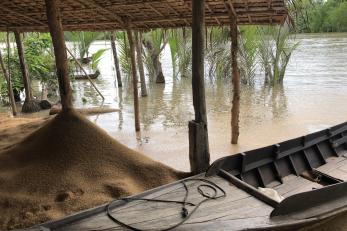Bridging Agricultural Livelihoods and Energy Access

This report presents the results of a one-year collaborative research project between Mercy Corps Myanmar, Renewable Energy Association of Myanmar with Biomass Energy Association of Myanmar and the Tyndall Centre for Climate Change Research at the University of Manchester. The project explored the intersection between agricultural livelihoods and energy access through an investigation of social networks in rice and rice husk value chains in rural farming communities of Labutta in Myanmar’s Lower Delta.
Rice production is an important agricultural activity in Myanmar, significantly contributing to its economy by providing income and employment to half of the country’s population. However, because of lack of access to electricity in many rural areas, rice farmers have limited opportunities to increase their income. For many off-grid communities, heat and electricity for household lighting and livelihood activities are provided through steam and electricity produced from combustion or gasification of rice husk – a by product of rice milling. With an estimated over 3 million tonnes of rice husk produced every year, Myanmar has potential to utilise rice husk for income-generating activities and energy generation in order to support agricultural production and rural livelihoods.
Focusing on case study sites in Bi Tut and Kan Bet in Labutta, this research mapped social networks in rice production and rice husk value chains. This allowed us to identify actors and network structures that could play important roles in supporting energy access and increasing livelihood opportunities for smallholders. In addition to this, interviews and focus group discussions with farmers and millers also revealed important challenges and opportunities for rice husk bioenergy within rural farming communities.


